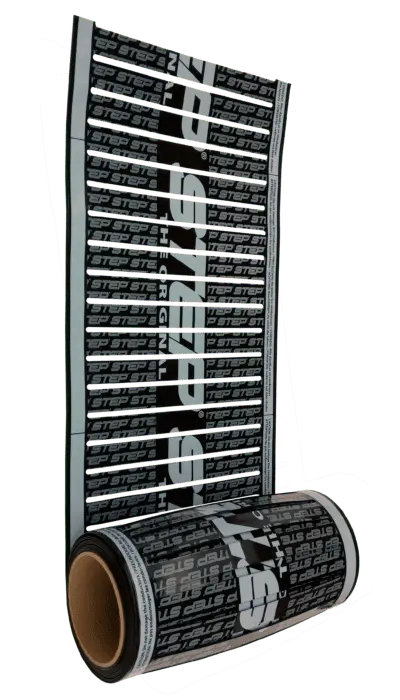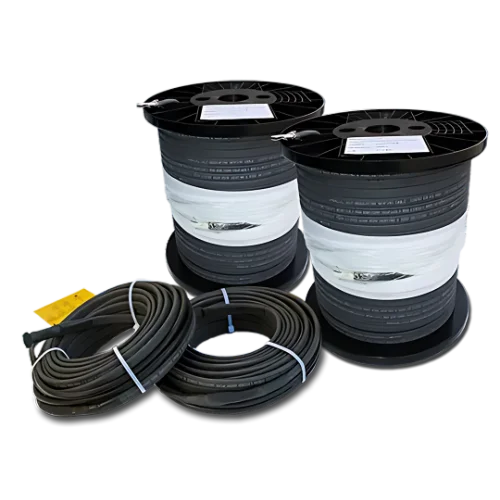Heated Metal Roof - Deicing & Snow Melt Systems
Roof Deicing / Metal Roofs
Rated 4.9/5  By Hundreds of Loyal Clients.
By Hundreds of Loyal Clients.
As seen in






Why A Heated Metal Roof?
With heavy snow and freezing rain, heated metal roof systems offer protection against ice dams, snow loads, and clogged gutters.
Keeping ice off your roof preserves both the structural integrity of your home and your roof’s longevity.
Our metal roof snow melt systems bring advantages like:
- Reduced stress from snow buildup
- Prevention of ice dams and icicles, reducing leaks and property damage
- Year-round gutter and downspout protection against ice blockages
- Safer conditions around your home with less risk of falling ice
We offer three cost-effective and efficient ways to heat your metal roof without compromising your home’s safety:
- Heated Tape for Metal Roofs
- Gutter Heat Tape
- STEP Snow Melting Systems

Low Voltage
Powered by safe low-voltage technology, our systems maximize snow melting power efficiently, consuming up to 30-60% less energy.

Total Peace of Mind
The low-voltage heating elements are intrinsically safe, and there is no need for grounding devices to prevent shock.

Easy Installation
Simply nail or staple into place. Prefabrication services are available to reduce onsite installation time.
Heat Tape For Metal Roofs
Our self-regulating metal roof heat tape adjusts heat output automatically to prevent ice buildup at edges and valleys. Its optimized energy usage makes it efficient and safe, as there’s minimal risk of burnout.
There’s a length to match every project, with reels ranging from 50 to 150ft.
Benefits
- Energy Efficient: Power adjusts based on temperature changes, optimizing energy use.
- No Overheating or Burnout: Remains safe even if overlapped, protecting against fire risk.
- Single-Point Connection: Comes pre-terminated for a quick, straightforward installation.
- Easy Installation: Pre-assembled with power connection and seal kits; no special tools or skills required.
- Safe and Durable: High-quality outer jacket and carbon core ensure durability, even in harsh conditions.
- Environmentally Adaptable: Suitable for various environments, including hazardous and corrosive areas.
- Maintenance-Free: Operates automatically with no manual intervention required.
- Customizable Length: Can be cut to length in the field for precise applications.
Disadvantages
- Generally only covers roof edges and gutters.
- Needs an electrical connection and periodic maintenance.
Price: $425 – $495 per 100 foot
Gutter Heat Tape
Designed to keep gutters and downspouts clear of ice, our gutter heat tape supports proper drainage and prevents the formation of dangerous icicles and ice dams.
It matches most gutters and ranges in length from 50 to 150ft.
Benefits
- Energy-Saving: Adjusts power output in response to temperature shifts, making it highly efficient in cold and milder conditions.
- No Overheating Risk: Safely overlaps without any risk of overheating or burnout, minimizing fire hazards.
- Pre-Terminated Connection: Single-point connection comes ready-made, speeding up installation and reducing setup time.
- Simple Setup: Pre-assembled with essential power connection, splice, and seal kits, eliminating the need for specialized tools.
- Robust and Long-Lasting: Made with a resilient carbon core and tough outer jacket, designed for dependable performance in harsh environments.
- Safe and Resilient: Built for long-lasting performance in all conditions.
- Maintenance-Free: Functions automatically, without manual adjustments.
Disadvantages
- Works best in conjunction with roof heat tape.
- May need setup for consistent power access in winter conditions.
Price: $300 – $600 per 100 foot
Installation Guide For Roof & Gutter Heat Tape
Our heat and gutter tape for metal roofs is straightforward to install and often DIY-friendly.
Here’s how you go about it:

1. Determine Your Layout
Identify high-accumulation areas like roof edges, valleys, or gutters.

2. Attach the Gutter or Heat Tape
Secure the tape by simply nailing it down, and avoid overlapping to keep it in good working order.

3. Connect it Up
Plug your gutter or heat tape into an exterior outlet or hardwire it. Its self-regulating technology takes care of the rest by automatically adjusting to ambient temperatures.
Technical Specs for Roof and Gutter Heat Tape
| Specification | Value |
|---|---|
| Maximum Continuous Exposure | +149°F |
| Minimum Installation Temperature | -40°F |
| Power Output | Self-regulating, varies by temperature |
| Durability | Resistant to hazardous/corrosive environments |
| Safety Features | Prevents overheating or burnout, safe for overlap |
| Voltage | 120V – 240V |
STEP Deicing System
Our STEP deicing system offers full-roof heating with semi-conductive heating elements, providing even heat coverage across your entire roof.
Low voltage operation makes it a minimal safety hazard while simultaneously giving you the advantage of lower power consumption.

Benefits
- Self-regulating: To conserve energy.
- Full Roof Coverage: Ideal for extensive areas beyond roof edges.
- Highly Efficient and Low Voltage: Runs safely at low voltage for energy savings.
- Durable: Designed for longevity in extreme temperatures.
- Versatile: Compatible with various roofing materials, including metal.
- Convenience: No manual intervention needed.
Disadvantages
- Higher initial cost compared to heat tape.
- Complex setup best suited to professional installation.
Installing Your STEP Deicing System
Because of its unique setup, we advise professional installation for our STEP deicing system.

1. Choose Your Coverage Area
Cut the STEP heating elements to cover your entire roof or specific areas.

2. Secure the Elements
Place the elements directly on the roof surface, trimming around roof features as needed.

3. Power Connection
Use a low-voltage transformer (24-50 volts) for safe and efficient operation.
Roof & Gutter Heat Tape vs STEP Deicing System
| Feature | Roof & Gutter Heat Tape | STEP Deicing System |
|---|---|---|
| Self-regulating | ✔️ | ✔️ |
| Full roof coverage | ❌ | ✔️ |
| Targeted roof coverage | ✔️ | ✔️ |
| Energy efficient | ✔️ | ✔️ |
| DIY friendly | ✔️ | ❌ |
| Low maintenance | ✔️ | ✔️ |
| Heavy snow | ❌ | ✔️ |
Tips for Measuring Your Metal Roof
In order to determine how much metal roof heat cable you will need to purchase, you will need to measure your metal roof.
These tips can help you calculate an accurate measurement:
- Take the time to measure the entire roof at least twice so that you know your measurements are as accurate as possible.
- Measure the area of the roof and the area of the gutter, as well as other aspects of your metal roof, such as the downspout, seam spacing, overhang width, and valley length.
In addition to measuring your metal roof, you also will want to create a map of the roof and identify problem spots where ice and snow accumulation typically occurs.
This useful information will ensure that you and your contractor design a heated metal roof system that is customized to meet your needs.
Our Gutter Heat Tape
Our Roof Heat Tape
FAQs
Absolutely. Metal roof snow melt systems, including heat tape and the STEP deicing system, effectively keep metal roofs ice-free.
For metal roofs, self-regulating heat tape is ideal. It adjusts based on temperature, preventing overheating and energy waste.
Heat tape provides targeted heating for edges and gutters, while the STEP system offers comprehensive coverage for full-roof deicing.
Yes. Both self-regulating heat tape and STEP systems adjust output based on temperature, conserving energy.
To remove deep snow, use a roof rake with a long handle to carefully pull snow off the roof without climbing or risking damage. For heavy accumulations, consider hiring a professional.
10,000+ homeowners are already living more comfortably & efficiently with Greenwave.
I want Greenwave to help me with:





 By Hundreds of Loyal Clients.
By Hundreds of Loyal Clients.
